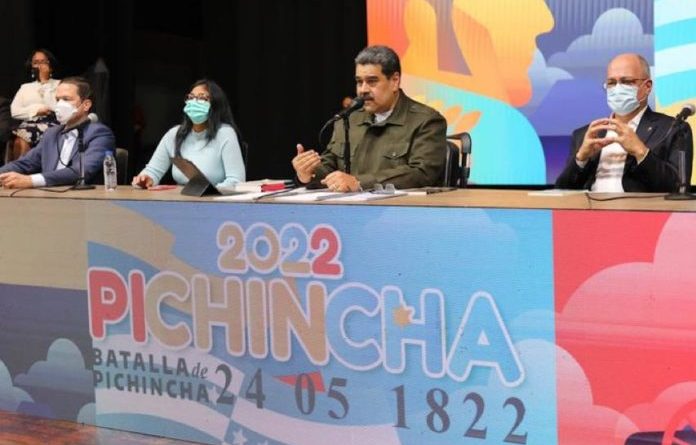The President of the Republic, Nicolás Maduro, rejected this Tuesday the discriminatory and exclusionary nature applied by the United States government, by denying the official participation of Venezuela, Cuba and Nicaragua in the Summit of the Americas, scheduled for next June in the city of Los Angeles.
In this regard, he assured that the Summit of the Americas “became the summit of the protest against anti-imperialist exclusion”.
“They intend to exclude us because they are afraid of the voice of the Bolivarians, they do not want the voice of Bolívar and Chávez to reach there”, denounced the Venezuelan Head of State during his participation in the closing of the international colloquium commemorating the bicentennial of the Battle of Pichincha, performed at the Municipal Theater in Caracas.
«From Venezuela we say to the South American peoples: The great times of union are before us”, he emphasized.
Unfair exclusion:
He reiterated that it is an «unjust, totally unjustified, discriminatory exclusion» in which the imperialist discriminatory role is demonstrated «against us, the peoples who fight for our ideas”.
He affirmed that the discriminatory and unjustified position of the United States government has generated a great protest by more than 25 governments of Latin America and the Caribbean, due to this attempt by Washington to exclude three sovereign countries, after alleging that they are undemocratic:
“At this point, whatever they may do in Washington, the voice of Venezuela, Cuba and Nicaragua will reach Los Angeles, in the great protests in Los Angeles. Our voice will be present at the summit, whatever the United States Government may say”, he assured.
In this context, President Maduro thanked the prime ministers of the Caribbean islands and his counterparts Luis Arce from Bolivia, Alberto Fernández from Argentina, and particularly Andrés Manuel López Obrador, president of Mexico: “for their courage, solidarity and support» for the inclusion of Venezuela in the Summit of the Americas.
“Imperialist gentlemen: you have not been able, nor you will ever be able to defeat us. You have not been able to exclude us. Surprises there will be. I am buying my ticket already. I’m going to arrive by foot to a big march in Los Angeles”, he noted.
In this sense, he insisted that given the moment that humanity lives, «union, diversity, democracy, the right of all peoples to express their own opinions» must prevail in the region, highlighting the preponderant role that the Community of Latin American and Caribbean States (CELAC) must play in this effort.
He predicted that although the project of the Union of South American Nations, Unasur, was hit by the right wing, «sooner rather than later it will resume and resurface like the phoenix”.
Bicentennial of the Battle of Pichincha:
In the colloquium on the Battle of Pichincha, more than 40 historians from Mexico, Cuba, Colombia, the Dominican Republic and Venezuela, discussed the importance of this historical event to seal the independence of Ecuador.
The three main themes of the colloquium were related to the union of our America, the anti-colonial and anti-imperialist struggles, and the bicentennial cycle of independence.
In this regard, Maduro mentioned that this battle and the campaign in the South were planned and designed by the Liberator Simón Bolívar with a view to consolidating «a great nation of republics,» which materialized with the birth of the Gran Colombia:
“We are historically aware that we are part of a process of more than five hundred years of resistance; And if we know something well today, it is that we are part of something much bigger on an individual level. We are part of the Great Homeland, the South American, Caribbean homeland, which today celebrates a day of glory”, he stressed.
Emancipatory Feat:
On May 24, 1822, Sucre and the Liberation Army faced and defeated the imperialist soldiers, led by military man Melchor Aymerich.
The battle sealed the independence of the department of Quito, previously called the Real Audiencia de Quito, from the Kingdom of Spain, which in turn promoted the independence of the territory currently known as the Republic of Ecuador.
Manifesto for self-determination:
In the final manifesto of the colloquium, the 40 participating historians demanded respect for the self-determination of peoples and rejected the use of war as an instrument historically used by empires to impose their criteria and interests on countries that do not bow.
They rejected the interference of the United States in the internal affairs of the countries and condemned the «permanent aggression» by Washington against Venezuela, Nicaragua, Cuba, Iran, Syria and Russia.
“We defend the Bolivarian Revolution as an irreversible political project. We claim the flag of peace and dialogue as the only instrument to live in peace”, reads part of the manifesto.
